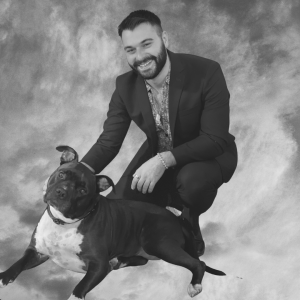French Bulldogs Are Flooding Shelters—What to Know Before Adopting One
One Florida rescue reports a recent intake of over 150 Frenchies thanks, in large part, due to irresponsible breeders.

share article

Your pet wants you to read our newsletter. (Then give them a treat.)
For the second year in a row, French Bulldogs are at the top of the list of America’s favorite dogs. And it’s easy to see why. They’re cute as hell, barely shed, and, let’s be honest, are arguably the quietest small breed. But as those of us who were woefully priced out of Eras Tour tickets can attest, massive demand often has unintended consequences. Frenchies’ highly sought-after statusopens in a new tab has created a surplus of breeders, many of whom tip-toe around any semblance of ethical standards.
“With backyard breedersopens in a new tab, there’s no health testing; they’re not putting any thought process into the breeding,” says Ashley Pedersen, founder of Space Coast Frenchie Rescueopens in a new tab in Palm Bay, Florida. “It’s all about money; it is not about the dogs. It’s just creating puppies for profit. And when those puppies have issues, they surrender them to rescues.”
Breeders are the root of the problem.
Pedersen admits she used to be a French Bulldog breeder, though certainly not of the backyard variety. After witnessing widespread unethical practices among many other breeders, she created Space Coast to help out the dogs left behind.
Within the nonprofit’s mere seven months of existence, they’ve already taken in over 150 Frenchies, many of whom were dumped off by amateur breeders unsatisfied with their “product.” She remembers one instance when a breeder reached out to the group for a meet-up in Miami. “He handed us five dogs in a parking lot. All with major issues,” she says.
Due to their insane popularity, Pedersen explains that French Bulldog breeding has created the illusion of a get-rich-quick scheme. “Backyard breeders are spending 10-plus grand on a dog because they’re getting roped in by other backyard breeders who are like, ‘If you buy this dog for $10,000, you’re going to make all this money from breeding it.’ So, it’s really a vicious cycle,” she adds.
Another issue here is that many breeders tend to focus on specific and superficial traits that may have the animals looking their best but not necessarily feeling it.
Leigh Siegfried, founder of Opportunity Barks Behavior Trainingopens in a new tab in Philadelphia, explains that these pups have developed several rare coat colorations over time that breeders see as particularly desirable.
Unfortunately, this can influence how groups approach their breeding without paying much attention to health. It’s like a smaller-scale version of every supervillain who has attempted to play God. Megalomaniac or not, the results are never pretty. “When you breed for a select trait, you basically skew the genetics — you skew everything, really. You’re moving further and further away from natural selection, and you’re moving towards a less hearty dog in general,” Siegfried adds.
But the fault goes well beyond breeders.
Now, while negligent breeders are clearly the Big Bad in this situation, they’re not the only culprits here. Nor are they solely responsible for over 150 Frenchies landing in one shelter in just over half a year. Pet parents are also buying dogs from these breeders, therefore reinforcing the demand. They’re also returning them to shelters when they are eventually faced with the true responsibility of their purchase.
“The result: overbreeding, inbreeding — and because of unregulated breeding practices, unscrupulous breeders have taken advantage of the situation. Well-meaning owners often end up purchasing these pups at what looks like bargain prices, paying $1,000 versus $5,000, only to realize they have made a mistake,” says Dr. Carol Osborne, veterinarian and founder of the Chagrin Falls Veterinary Center and Pet Clinicopens in a new tab.
It’s a stark reminder that French Bulldogs are not accessories to be flaunted but family members that are living creatures to be cared for. These dogs can present unique challenges, the responsibility of which should not be lost on potential pet parents. So, if you’re considering introducing a Frenchie into your life — ideally by adopting from a shelter like Space Coast — here are a few things to keep in mind before signing up for the commitment.
What to know before adopting a French Bulldog
Frenchies have a heightened risk of several health conditions.
For starters, both Siegfried and Dr. Osborne note that French Bulldogs are predisposed to skin allergiesopens in a new tab. As a brachycephalic breedopens in a new tab, their nostrils are also quite narrow, which can further compromise their respiratory system. Pedersen adds that many struggle with an elongated soft palate, meaning the roof of their mouth is too long for the length of their mouth. This can result in breathing problems, when the additional length begins to block the entrance to the windpipes at the back of the throat, also known as brachycephalic airway syndrome.
Despite this, the most alarming risk is likely intervertebral disc disease (IVDD). It’s a condition concerning the dog’s spinal cord and surrounding nerves that can lead to chronic pain, mobility issues, and even paralysis if ignored. Frenchies are especially prone to IVDD largely due to their unique body structure. Specifically, if a French Bulldog has a short back and tiny tail, they’ll be at an increased risk of IVDD. Beyond that, Dr. Osborne confirms that sensitive stomachs and intestinal issues are similarly common in the breed.
As a result, vet bills can pile up.
When your dog is faced with such a laundry list of medical concerns, vet visits will naturally add up (here’s your reminder to get pet insuranceopens in a new tab). To be clear, this is a generalization and not a definitive expectation. Pedersen’s own French Bulldog, who pulls double duty as Space Coast’s CEOopens in a new tab, rarely makes unexpected trips to the vet according to the founder. Pedersen confirms he generally only needs routine yearly checkups for vaccines and shots.
But a lot of these health concerns do arise when dogs are irresponsibly bred. So, there is always a risk that the Frenchie you’re adopting was a product of such misguided practices and will require considerable aid. You can, of course, inquire about medical history prior to signing the papers but not all issues will be immediately present.
Not to mention, if these dogs are being dumped off by careless breeders who see them as nothing more than damaged goods, you wouldn’t exactly expect them to include a detailed breakdown of their health. Siegfried agrees that not every Frenchie will inherit all of these medical concerns, but when they’re the result of poor breeding practices, issues can arise.
“Generally speaking when you get a dog with a limited gene pool, you are always opening yourself up to the potential for more health issues due to the fact that you don’t have natural selection working in your favor,” she explains.
These dogs might not support the most active lifestyle.
Don’t get me wrong: This could certainly track as more of an advantage for some. If you’re someone who prefers the slow-paced lifestyle of a pup who can’t necessarily get a lot of exercise, rescuing a Frenchie may be for you. But for others who like to adventureopens in a new tab with their dogs, the lacking physical abilities of many Frenchies can be a real complication down the road. And this extends into the household, as well.
“They’re small so just being able to go up and down the steps at times, depending on how old they are, can be a physical limitation,” Siegfried says.
She does clarify that some French Bulldogs are talented at jumping up and down like little goats. Still, their small frame will be a limitation for many. That being said, Pedersen warns that too much jumping around, even just in the home from couches or beds, can potentially lead to IVDD. And if you’re a beach lover or fan of water sports, it’s probably best to look elsewhere for a poolside companionopens in a new tab.
“Swimming is a no-no, Frenchie’s just sink,” Dr. Osborne warns. This is all compounded by the fact that French Bulldogs have a proclivity to overheating, especially if they have any respiratory issues. Dr. Osborne says prolonged exposure to humid temperaturesopens in a new tab and climates above 75 degrees should be avoided for the breed.
Of course, like any dog, Frenchies still need exercise. But the methods of doing so will require a lot of engagement on your part. “Don’t underestimate that these guys need exercise but again, you don’t want them overheating,” Siegfried says. She recommends regular gamesopens in a new tab of fetch, tug, or essentially any activity where the pup’s drive can be nurtured and fulfilled in a controlled environment.
They’re great dogs for the right people.
None of this is meant to outright deter you from rescuing and adopting a French Bulldog. As someone who’s around them all day, Pedersen can attest to the fact that they make great pets. “They love their people, and they want to be with their people. The number-one reason for owning a Frenchie is definitely their personality,” she confirms.
It’s not their fault that they were brought into this world under questionable circumstances, especially those born at the hands of backyard breeders. But, not unlike Taylor Swift tickets, these dogs aren’t for everybody. If you’re looking for a less active pup to hang around the house with all day, a French Bulldog could be perfect for you. Granted you have the funds (a call again for pet insurance!) to deal with potentially frequent trips to the vet.
References:
French Bulldogs Continue Their Reign as Most Popular Dog for 2nd Straight Yearopens in a new tab

Sean Zucker
Sean Zucker is a writer whose work has been featured in Points In Case, The Daily Drunk, Posty, and WellWell. He has an adopted Pit Bull named Banshee whose work has been featured on the kitchen floor and whose behavioral issues rival his own.
Related articles
![A cute dog standing outside with a leash looking up.]() opens in a new tab
opens in a new tabHow to Protect Your Pet During LA’s Canine Crime Wave
Dognappers are targeting designer breeds like French Bulldogs. We asked a pet detective for tips on how to keep your pup safe.
![An English bulldog resting on a floor.]() opens in a new tab
opens in a new tabDo English Bulldogs Face Extinction?
One of the most popular breeds in the world is also one of the least genetically diverse, causing huge implications for the breed.
![dog sneezing outside in grass]() opens in a new tab
opens in a new tabWhy Do Dogs Sneeze?
Other than to completely freak you out.
- opens in a new tab
Reverse Sneezing in Dogs: Causes and Treatment
Don’t panic: It’s called reverse sneezing, and in most cases, it’s nothing to worry about.
![Dog laying down in dog bed and coughing]() opens in a new tab
opens in a new tabWhy Is My Dog Coughing?
Seven reasons to be concerned when your dog is coughing.
![french bulldog with orange collar standing on grass]() opens in a new tab
opens in a new tabVets Can Do More To Reduce The Suffering of Flat-Faced Dog Breeds
Veterinarians must do more to discourage the breeding of animals with conditions known to seriously compromise their welfare.
![Girl sleeping with her French Bulldog dog in bed.]() opens in a new tab
opens in a new tabA New Study Finds Flat-Faced Dogs Get Pretty Crappy Sleep
It’s one of several health problems facing brachycephalic breeds.











